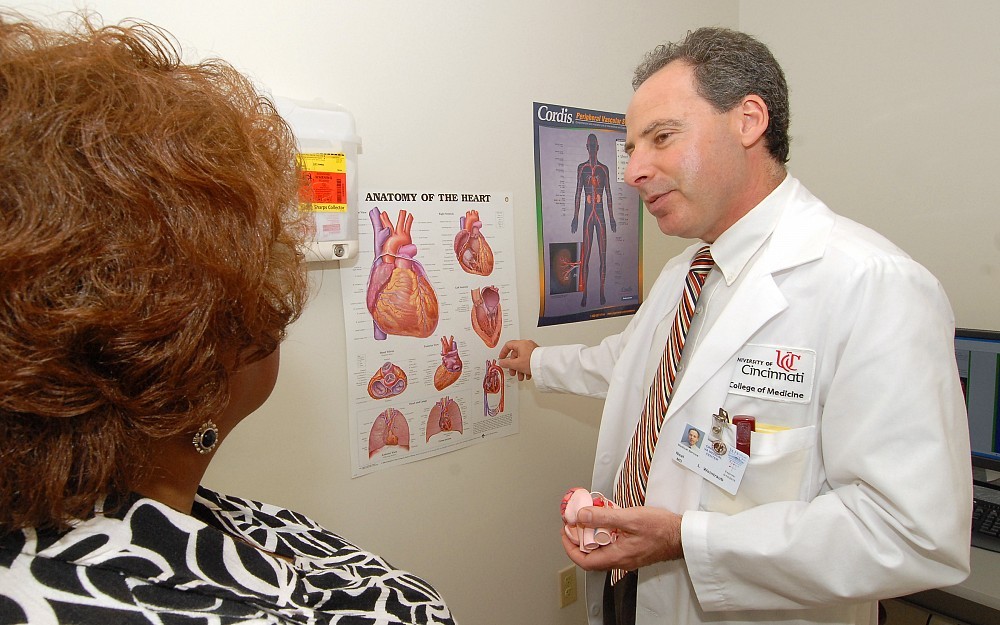
High-Fat Diets Inflame Fat Tissue Around Blood Vessels, Contribute to Heart Disease
CINCINNATIA study by researchers at the University of Cincinnati shows that high-fat diets, even if consumed for a short amount of time, can inflame fat tissue surrounding blood vessels, possibly contributing to cardiovascular disease.
These findings will be published in the Feb. 20 edition of the American Heart Association journal Circulation Research.
Neal Weintraub, MD, and colleagues examined adipose tissueor fatsurrounding the coronary arteries of humans. The researchers found these fat cells to be highly inflamed, suggesting that they could trigger inflammation of the blood vessels, an important component of atherosclerosis.
They also found that the inflammation of fat tissues around the arteries of mice is increased by feeding the animals a high-fat diet for just two weeks.
This is independent of weight gain or blood lipidscholesterol levels, says Weintraub, senior author of the study and chair of the cardiovascular diseases division at UC.
Weintraub says that high fat diets contribute to atherosclerosisor the hardening of arteriesin a number of ways.
Elevated blood lipidsor cholesterol levelscan worsen with the intake of high fat diets, and this is known to contribute to atherosclerosis, he says. However, many patients who consume high fat diets do not exhibit abnormal lipid profiles but still develop atherosclerosis nonetheless.
These new findings suggest a direct link between poor dietary habits and inflammation of blood vessels, mediated by the fat cells surrounding the blood vessel wall.
Weintraub adds that the diet fed to the mouse models was not unlike the diets consumed by many Americans.
It produced striking abnormalities of the fat tissue surrounding blood vessels in a very short period of time, he says. This is a warning to those who say there isnt a problem because their weight and cholesterol levels are under control. Lipid profiles dont hold all the answers.
Bad dietary habits can lead to a number of problems, and this suggests that a high fat diet is detrimental in ways we didnt previously understand.
Weintraub says there is no real way to measure the effects of poor dietary habits on fat tissue surrounding blood vessels.
We dont know why these cells are so responsive to high-fat diets, he says. We must now conduct further experiments to answer these types of questions.
Researchers in the division of transplant surgery at UC and in the emergency medicine department at UC and the University of Iowa Carver College of Medicine were also involved in this study.
This study was funded by the National Institutes of Health.

Neal Weintraub, MD, chair of the cardiovascular diseases division

Neal Weintraub, MD, director of the cardiovascular diseases division
Related Stories
How to navigate hypertensive disorders during, after pregnancy
April 14, 2025
Experts report having a hypertensive disorder of pregnancy has been associated with a variety of complications postpartum, including heart failure, stroke, chronic kidney disease and diabetes.
Doctors prepare for surgeries with 3D-printed organs
April 11, 2025
Meteora3D, a Venture Lab-backed startup, helps surgeons better understand upcoming procedures by designing and developing quick-to-produce, 3D-printed anatomical models.
A 'night on the Serengeti' — in Cincinnati
Event: April 12, 2025 6:30 PM
University of Cincinnati and Village Life Outreach Project celebrate two decades of service to communities in rural Tanzania. The milestone will be honored on April 12 with a vibrant fundraiser titled “Village Life: Night on the Serengeti,” hosted at Cincinnati’s contemporary 21c Museum Hotel. The evening promises Tanzanian cuisine, art, live performance and, most importantly, a renewed call to sustain a mission that has transformed lives across continents.
